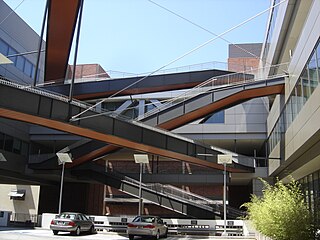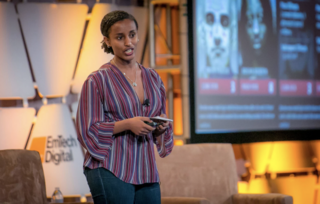
Kenneth Yigael Goldberg is an American artist, writer, inventor, and researcher in the field of robotics and automation. He is professor and chair of the industrial engineering and operations research department at the University of California, Berkeley, and holds the William S. Floyd Jr. Distinguished Chair in Engineering at Berkeley, with joint appointments in Electrical Engineering and Computer Sciences (EECS), Art Practice, and the School of Information. Goldberg also holds an appointment in the Department of Radiation Oncology at the University of California, San Francisco.

UC Davis Medical Center (UCDMC) is part of UC Davis Health and a major academic health center located in Sacramento, California. It is owned and operated by the University of California as part of its University of California, Davis campus. The medical center sits on a 142-acre (57 ha) campus (often referred to as the Sacramento Campus to distinguish it from the main campus in nearby Davis) located between the Elmhurst, Tahoe Park, and Oak Park residential neighborhoods. The site incorporates the land and some of the buildings of the former Sacramento Medical Center (which was acquired from the County of Sacramento in 1973) as well as much of the land (and two buildings) previously occupied by the California State Fair until its 1967 move to a new location.

Eric Paulos is an American computer scientist, artist, and inventor, best known for his early work on internet robotic teleoperation and is considered a founder of the field of Urban Computing, coining the term "urban computing" in 2004. His current work is in the areas of emancipation fabrication, cosmetic computing, citizen science, New Making Renaissance, Critical Making, Robotics, DIY Biology, DIY culture, Micro-volunteering, and the cultural critique of such technologies through New Media strategies.
Eva Harris is a professor in the School of Public Health at the University of California, Berkeley, and the founder and president of the Sustainable Sciences Institute. She focuses her research efforts on combating diseases that primarily afflict people in developing nations.

S. Shankar Sastry is the Founding Chancellor of the Plaksha University, Mohali and a former Dean of Engineering at University of California, Berkeley.

The California Institute for Telecommunications and Information Technology (Calit2, previously Cal(IT)2), also referred to as the Qualcomm Institute (QI) at its San Diego branch, is a $400 million academic research institution jointly run by the University of California San Diego (UC San Diego) and the University of California, Irvine (UCI); in January 2022, plans were announced to add University of California, Riverside to the consortium. Calit2 was established in 2000 as one of the four UC Gray Davis Institutes for Science and Innovation. As a multidisciplinary research institution, it is conducting research discovering new ways in which emerging technologies can improve the state's economy and citizens' quality of life. Keeping in mind its goal of addressing large-scale societal issues, Calit2 extends beyond education and research by also focusing on the development and deployment of prototype infrastructure for testing new solutions in real-world environments. Calit2 also provides an academic research environment in which students can work alongside industry professionals to take part in conducting research and prototyping and testing new technologies.

The California NanoSystems Institute (CNSI) is an integrated research center operating jointly at UCLA and UC Santa Barbara. Its missions are to foster interdisciplinary collaborations for discoveries in nanosystems and nanotechnology; train the next generation of scientists, educators and technology leaders; and facilitate partnerships with industry, fueling economic development and the social well-being of California, the United States and the world.
David Ethan Culler is a computer scientist and former chair of the Department of Electrical Engineering and Computer Sciences at the University of California, Berkeley. He is a principal investigator in the Software Defined Buildings (SDB) project at the EECS Department at Berkeley and the faculty director of the i4Energy Center. His research addresses networks of small, embedded wireless devices, planetary-scale internet services, parallel computer architecture, parallel programming languages, and high performance communication. This includes TinyOS, Berkeley Motes, PlanetLab, Networks of Workstations (NOW), Internet services, Active Message, Split-C, and the Threaded Abstract Machine (TAM).
Michelle Khine is an American bioengineer who is a distinguished scientist and innovator at the University of California, Irvine, co-founder of Fluxion Biosciences Inc., the scientific founder of the Shrink nano-technology platform, as well as the Assistant and Founding Professor of the School of Engineering at UC Merced. Khine, an associate biomedical engineering professor in the Henry Samueli School of Engineering, is responsible for experimenting with childhood toys Shrinky Dinks to build microfluidic channels. Her research has enabled technological advances in industries including biological research and medical diagnostics.
Jean Paul Jacob was a Brazilian electronic engineer, researcher and professor.
Paul Kenneth Wright is a mechanical engineer best known for his work on the UC Berkeley-based CyberCut/CyberBuild project, which established a set of standards that streamlined the conversion of creative manufacturing designs into rapid prototyping. Wright's NYU research group is also known for developing the first open-architecture control-of-manufacturing systems, and for developing Internet-based CAD/CAM systems.
Dash Robotics, Inc. is a toy robotics startup company located in Hayward, California. Their main focus is on prototyping and manufacturing smart toys. The company is often referred to simply as "Dash," and was founded in 2013. Often mistakenly affiliated with UC Berkeley, they are not a part of the university although many of the company's members met there.
Delia J. Milliron is the T. Brockett Hudson Professor in Chemical Engineering at the University of Texas at Austin. Milliron leads a research team that focuses on developing and studying the properties of new electronic nanomaterials. Her team pursues studies on nanocrystals, nanoscale interfaces, and controlled assemblies of nanocrystals. Her team takes a systematic approach towards elucidating effects that arise at the nanoscale with a special focus on structure-property relationships.

Tsu-Jae King Liu is an American academic and engineer who serves as the Dean and the Roy W. Carlson Professor of Engineering at the UC Berkeley College of Engineering.

Rediet Abebe is an Ethiopian computer scientist working in algorithms and artificial intelligence. She is an assistant professor of computer science at the University of California, Berkeley. Previously, she was a Junior Fellow at the Harvard Society of Fellows.
Roya Maboudian is an American academic and researcher in the field of chemical engineering. She is professor of chemical and biomolecular engineering at the University of California, Berkeley. She is a co-director of the Berkeley Sensor and Actuator Center, and an editor of the IEEE Journal of Microelectromechanical Systems. She was one of the first women to earn tenure in the chemical engineering department at the University of California, Berkeley.

Costas J. Spanos is the Director of the Center for Information Technology Research in the Interest of Society (CITRIS) at UC Berkeley. He is also the CEO of the Berkeley Educational Alliance for Research in Singapore (BEARS) and the Andrew S. Grove Distinguished Professor of Electrical Engineering and Computer Sciences (EECS) at UC Berkeley.










